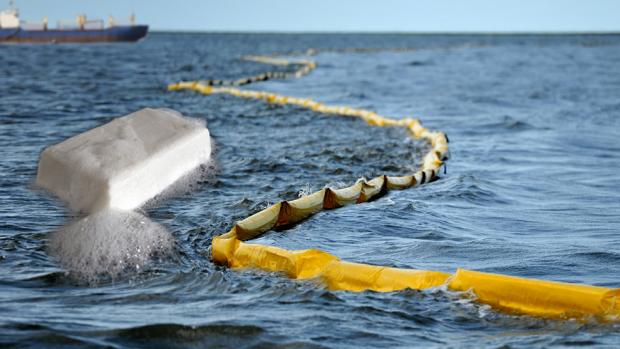Fighting Oil with Nature
NYU-Poly Professor Proposes Plan to Optimize Biosurfactants to Aid Gulf Cleanup

What if cleaning up the Gulf of Mexico wasn’t a matter of choosing between harsh chemical dispersants, labor-intensive skimming and potentially dangerous burns? Dr. Richard Gross, professor of chemical and biological science and Herman F. Mark chair at the Polytechnic Institute of New York University (NYU-Poly), claims nature has already provided the ideal weapons in the fight against the millions of gallons of oil still spilling into the Gulf.
Dr. Gross’ approach relies on biosurfactants, organic compounds produced in nature for the exact purpose of oil dispersion and remediation. Produced by microbes such as yeast, bacteria and fungi, biosurfactants are amphiphilic compounds—meaning they attract both lipids (such as oil) and water — and serve to reduce the surface tension between the two substances. This facilitates the breakdown and dispersal of lipid molecules into smaller droplets.
Biosurfactants work in tandem with naturally occurring marine organisms — already present in sufficient quantity in the Gulf — which utilize the oil droplets as food, converting them into carbon dioxide, water and biomass. Dr. Gross proposes introducing biosurfactants in sufficient quantity to assist these organisms in quickly converting the oil from the Deep Horizon spill.
Adapting nature’s approach to this disaster offers distinct advantages over current methods of remediation, according to Dr. Gross. “Unlike synthetic chemical dispersants, biosurfactants were designed by nature to provide marine microbes with a survival advantage in oil-rich environments,” he said.
Physical cleaning methods, including skimmers, vacuums and in situ burning, are limited by environmental factors, and chemical cleaning methods may have grave environmental repercussions for marine life. Biosurfactants are well accepted by nature and pose no threat to marine ecosystems.
The first challenge will be to determine biosurfactant compositions that can function most efficiently to disperse the massive quantities of oil waste under a range of marine conditions that include variations in the Gulf temperature and oil compositions.
The second challenge is to encourage natural oil-degrading marine organism at the spill site to attach to the oil droplets formed by the biosurfactants and then use the oil as a food source.
The third is to determine that all these things occur quickly to protect the delicate balance present in marine ecosystems.
Dr. Gross estimates a 12-month project would cost $500,000 and that a first-generation product could be delivered within six months. He envisions assembling a team of scientists and engineers to optimize biosurfactants to speed their performance and determine which compounds provide an optimal environment for oil-degrading microorganisms. The team would also develop a rapid fermentation process to produce the compounds at adequate scale for current needs and eventual stockpiling for future spills.
“Cleaning up a major oil spill frequently takes years, so there will be many opportunities to employ this technology in the Gulf of Mexico and elsewhere,” Dr. Gross said.
The author of more than 350 research papers, many of them on biosurfactants, Dr. Gross is also the director of the National Science Foundation Center for Biocatalysis. In 2003, he was honored with Presidential Green Chemistry Award.
About Polytechnic Institute of New York University
Polytechnic Institute of New York University (formerly Polytechnic University), an affiliate of New York University, is one of New York City’s most comprehensive schools of engineering, applied sciences, technology, and research, and is rooted in a 156-year tradition of invention, innovation, and entrepreneurship: i2e. The institution, founded in 1854, is one of the nation’s oldest private engineering schools. In addition to its main campus at MetroTech Center in downtown Brooklyn, it offers programs at sites throughout the region and around the globe. NYU-Poly has centers in Long Island, Manhattan and Westchester County; globally, it has programs in Israel, China and will be an integral part of NYU's campus in Abu Dhabi opening in autumn 2010.




